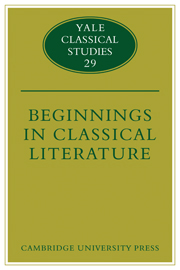Book contents
- Frontmatter
- Contents
- Introduction: beginning at Colonus
- How Greek poems begin
- The Muse corrects: the opening of the Odyssey
- Sappho 16, Gorgias' Helen, and the preface to Herodotus' Histories
- Tragic beginnings: narration, voice, and authority in the prologues of Greek drama
- Plato's first words
- Plautine negotiations: the Poenulus prologue unpacked
- Proems in the middle
- Openings in Horace's Satires and Odes: poet, patron, and audience
- An aristocracy of virtue: Seneca on the beginnings of wisdom
- Beginnings in Plutarch's Lives
- “Initium mihi operis Servius Galba iterum T. Vinius consules …”
“Initium mihi operis Servius Galba iterum T. Vinius consules …”
Published online by Cambridge University Press: 10 January 2011
- Frontmatter
- Contents
- Introduction: beginning at Colonus
- How Greek poems begin
- The Muse corrects: the opening of the Odyssey
- Sappho 16, Gorgias' Helen, and the preface to Herodotus' Histories
- Tragic beginnings: narration, voice, and authority in the prologues of Greek drama
- Plato's first words
- Plautine negotiations: the Poenulus prologue unpacked
- Proems in the middle
- Openings in Horace's Satires and Odes: poet, patron, and audience
- An aristocracy of virtue: Seneca on the beginnings of wisdom
- Beginnings in Plutarch's Lives
- “Initium mihi operis Servius Galba iterum T. Vinius consules …”
Summary
So begins Tacitus' famous account (Hist. 1.1ff.) of the year of the four emperors and, with it, the major phase in the author's career as a historian. Both beginnings, like so much else in Tacitus, are at least partially grounded in Sallustian precedent. The sentence itself, so we are informed, is an echo of the res populi Romani M. Lepido Q. Catulo consulibus ac deinde…gestas composui with which Sallust began his own Histories. Both works sought to give a general account of events over a significant period of years during the author's boyhood or youth; and each had been preceded by two preliminary studies devoted to, respectively, prominent individual Romans active toward the end of the period destined for treatment in the Histories (Agricola, Catiline) and prominent foreign enemies of Rome (the Germans, Jugurtha, and the Numidians).
The parallels are striking and perhaps sufficient in themselves to explain what might otherwise be inexplicable in Tacitus' choice of when and how to begin. Why start – unless out of deference to Sallustian, annalistic precedent – by recounting events from the beginning of a particular consulship? The two weeks (January 1–16, 69) during which Galba and Vinius held that office fell roughly in the middle of the period of rebellion and unrest which began in early 68, once it became apparent that Nero could no longer command the loyalty of his military and civilian subordinates, and ended only in 70, with the consolidation of the power of a new dynasty.
- Type
- Chapter
- Information
- Beginnings in Classical Literature , pp. 231 - 248Publisher: Cambridge University PressPrint publication year: 1992

